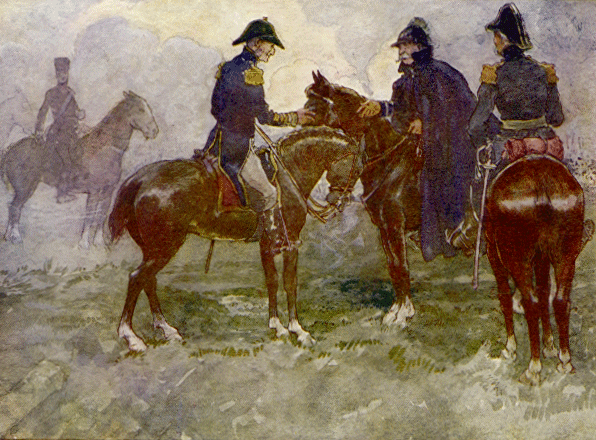



|
N APOLEON hated Britain so much that besides fighting against her with soldiers he tried to fight in another way. He tried to ruin British trade. Napoleon forbade other countries to trade with Britain. But it was of little use, and so ill did he succeed that his very own soldiers were dressed in British-made cloth and wore British-made boots.
As Portugal still traded with Britain, Napoleon made that an excuse for invading Portugal. At the same time he seized the King of Spain and his son, and forced them to sign a paper saying that they gave up the throne of Spain. Napoleon then made his own brother, Joseph Bonaparte, King. But although the King and Prince had been forced to sign away the throne, the people of Spain had something to say about it. They refused to have Joseph Bonaparte as their King. They rose to a man and rebelled against him, and they asked the British to help them. So two years after Trafalgar the Peninsular war began. It is called the Peninsular war because it was fought in and for the Peninsula formed by Spain and Portugal.
At first the war was not very successful, but when Arthur
Wellesley, afterwards Lord Wellington, took command, things
went better. Gradually the French
were driven back to
France, and the war ended with the battle of Toulouse, on
While this war was going on, Napoleon had also been fighting with Russia. There he was utterly crushed. Everywhere the peoples he had conquered revolted against him, and, a few days before the battle of Toulouse, he had been made to give up the throne of France, and was banished to the island of Elba.
Of the many kingdoms which Napoleon had conquered, this little island in the Mediterranean Sea was all that he was allowed to keep. But he soon grew tired of playing at being Emperor there. The following year, while the Kings and Princes of Europe were gathered at Vienna, trying to bring order and peace to the lands which Napoleon had upset with his wars and conquests, he left Elba and made straight for Paris. Cruel and selfish though he was, his soldiers loved him, for he had so often led them to victory. When he suddenly appeared among them, they flocked to him, and the people cheered and welcomed him.
Once more Napoleon was Emperor of the French, but this time his rule only lasted one hundred days.
The Kings and Princes at Vienna had not been able to agree about settling the affairs of Europe, but, when they heard that Napoleon was once more in Paris, fear of him made them all unite. They gathered their armies for a great struggle against the terrible Emperor.
Wellington had command of eighty thousand men, but only about half of these were British. The rest were Dutch, Belgian, and German. Blücher, the great German general, had another army of one hundred and fifty thousand men, and there was yet a third army of Russians and Austrians, and all these armies marched towards France.
But Napoleon did not wait for them to come. He marched out
to meet them, and a great battle took place on
"Ah," said Napoleon, "at last I shall measure swords with this Vilainton." For although the French and British troops had often met, Napoleon had always been fighting elsewhere, and had never met Wellington in battle.
The fight was fierce and long, and as Wellington watched and directed, he anxiously looked for Blücher and his Prussians, who had promised to join and help him.
"Night or Blücher," said Wellington, "night or Blücher," for he knew that the coming of either would put an end to the dreadful fight. At last, about seven in the evening, Blücher and his Prussians came.
Then Napoleon made one more desperate struggle for victory. The soldiers of his Old Guard, who had been kept in reserve, were ordered forward, but they broke and fled before the British charge. Napoleon, as he watched, became deadly pale. "All is lost," he said, turning to his officers, who surrounded him, "we must save ourselves." And he rode from the field.
Not till after the battle did Blücher and Wellington meet. In German fashion, the old Prussian general threw his arms round Wellington, and kissed him. It was a great victory, and by it Europe was saved from tyranny, yet Wellington was sad as he looked round on the dead and the dying.

Not till after the battle did Blücher and Wellington meet. |
The British troops were worn out with the long day's fighting, but the Prussians were still fresh, and Blücher started off to chase the flying Frenchmen, who ran as fast as they were able. They hid in the woods and ditches, and threw away their arms, knapsacks, and every thing they could, so that they might run the faster and escape from the pursuing Prussians. They fled till they passed the borders of France, where they scattered to their homes, a broken, beaten army, never to be gathered together again.
Napoleon gave himself up to the British. He was taken to
England on board a British
He was kept on board the Bellerophon until the Kings of Europe decided to send him to St. Helena, a lonely island in the Atlantic ocean. There he could do no harm, and there he stayed until he died, six years later.